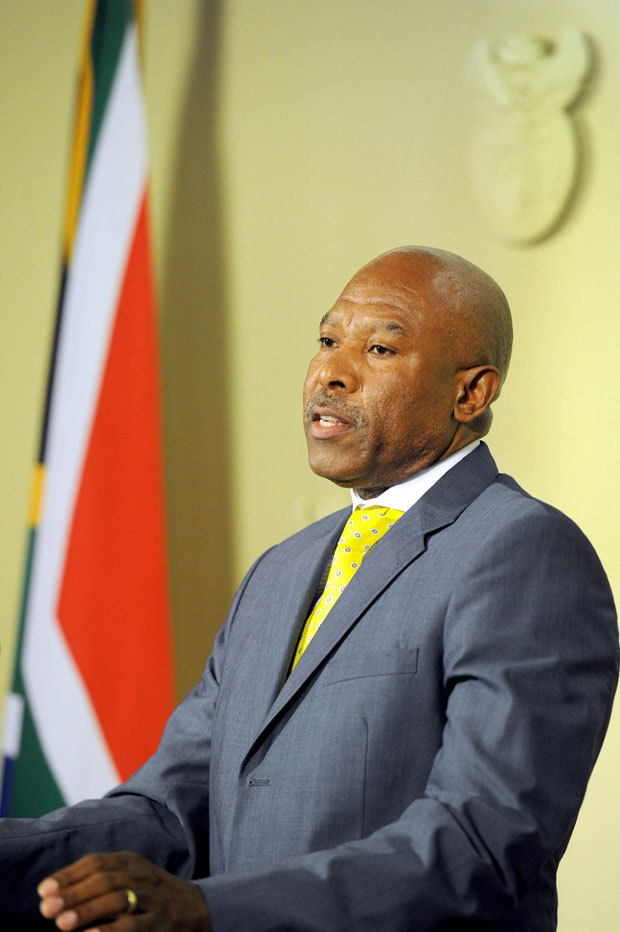Reserve Bank cuts repo rate to 5.25% per annum
Kganyago delivered the MPC decision via a virtual link as opposed to the traditional media briefing, in line with the measures announced by President Cyril Ramaphosa to limit public engagements in order to mitigate the spread of COVID-19.

- Country:
- South Africa
In line with market expectation, the Reserve Bank has cut the repo rate by 100 basis points to 5.25% per annum, Governor Lesetja Kganyago announced on Thursday.
“The MPC decided to cut the repo rate by 100 basis points. This takes the repo rate to 5.25% per annum, with effect from 20 March 2020. The decision was unanimous,” said the Governor following the two-day meeting of the Monetary Policy Committee (MPC).
The decision comes as the globe is fighting the COVID-19 (Coronavirus) pandemic.
Kganyago delivered the MPC decision via a virtual link as opposed to the traditional media briefing, in line with the measures announced by President Cyril Ramaphosa to limit public engagements in order to mitigate the spread of COVID-19.
The Governor said since the January meeting of the committee, the bank’s forecast for inflation has continued to moderate, in line with monthly inflation data and recent lower oil prices.
“Globally, a once-healthy economic growth outlook has been revised down sharply due to the outbreak and spread of COVID-19,” he said adding that the Coronavirus will negatively affect global and domestic economic growth through the first half of 2020 and potentially longer.
This he said would depend on steps taken to limit its spread. On Sunday, President Cyril Ramaphosa declared the pandemic a national disaster.
The Chinese economy, where the virus originated, is expected to contract by 1% in the first half of 2020.
Impact of Coronavirus
The bank has marked down growth for 2020 to 1.1%, before rising to around 2.8% in 2021.
Meanwhile, South Africa’s domestic economic outlook remains fragile with the Coronavirus likely to result in weaker demand for exports and domestic goods and services.
Its impact on the economy he said, could be partly offset by lower oil prices.
“We also expect disruptions to supply chains and to normal business operations. The bank now expects the economy to contract by 0.2% in 2020. Gross Domestic Product growth is expected to rise to 1.0% in 2021 and to 1.6% in 2022,” he said.
Apart from the virus, electricity supply constraints and other sources of uncertainty are expected to keep economic activity muted.
In addition, the technical recession that the country now finds itself in has contributed to a lower economic growth forecast.
“In addition, COVID-19 and existing constraints such as load shedding, imply significant downside risk to the forecast,” he said.
The Bank’ s headline consumer price inflation forecast averages 3.8% for 2020, 4.6% for 2021, and 4% in 2022. The forecast for core inflation is lower at 3.9% in 2020, 4.3% in 2021, and 4.4% in 2022.
“With the downward revision to the forecast, the overall risks to the inflation outlook at this time appear to be balanced. Electricity pricing remains an immediate concern, and there is likely to be higher volatility in prices of other goods and services as a result of sharp changes in demand and supply.”
Kganyago said global economic and financial conditions are expected to remain highly volatile for the foreseeable future.
“The Committee will continue to assess risks to inflation, including from weaker economic growth and those arising from wage, price pressures, and currency depreciation,” he said.
In a research note on Monday, Nedbank economists said should COVID-19 not be contained by the second quarter, further cuts could be in the pipeline.
(With Inputs from South African Government Press Release)
ALSO READ
My taxable income plummeted to Rs 680 in 2021-22 due to Covid-19 losses: BJP's Chandrasekhar
Pakistan’s economic outlook ‘uncertain’, says ADB as it predicts 1.8% growth for FY2024
**Updated Headline:** **Secure Your COVID-19 Vaccine Certificate: A Comprehensive Guide to Download from Co-WIN, UMANG, and Aarogya Setu**
Report of workshop on COVID-19 vaccine strain updates held by ICMRA-WHO published
Productivity driven growth fuels optimistic economic outlook for India: Morgan Stanley










